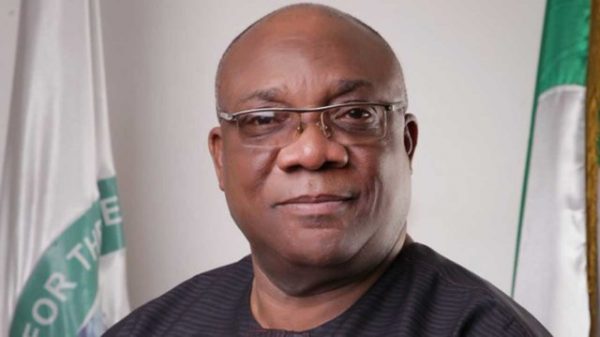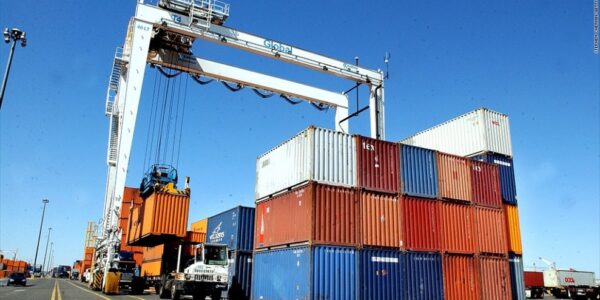Seme Border Closure Claims 67 Lives, Billions In Losses

· Freight agents demand billions of Naira as compensation
· How Benin Republic authorities rip-off Nigerian shippers
Freight agents and stakeholders at the Seme Border may seek billions of Naira as compensation from the Federal Government after a comprehensive evaluation of losses for the destruction of their goods and loss of lives occasioned by the closure of the border for more than three years without any material benefits to the nation.
No fewer than 67 stakeholders allegedly lost their lives to the closure of Seme Border under President Muhammadu Buhari as victims and survivors continue to lament and recount excruciating experiences of the seeming bad economic policy.
In a somewhat corroboration of this melancholic narrative, the Customs Area Controller(CAC) of Seme Border Customs Command, Compt. Dera Nnadi had told the media how he met only three functional clearing licences on assumption of office but was able to restore 27 licences which now help to generate revenue for the nation.
He further said that business activities at the command were at their nadir and are struggling to pick up, a development that accounts for the low revenue generation for the command with barely N1. 2 billion mark by half year 2023.
The border has been reopened but restricted to only export and import of ECOWAS Trade Liberalization Scheme(ETLS) cargoes, excluding vehicle import through the land border.
Enumerating the constraints of freight forwarders at Seme Border since the reopening of the land border before the Acting Comptroller General of Customs(CGC) Adewale Adeniyi who was on tour of Western zone of customs formations, the Chairman of the Association of Nigerian Licensed Customs Agents(ANLCA), Mr. Onyekachi Ojinma confirmed that over 67 agents lost their lives being the aftermath of the sudden closure of the border while most goods paid for could not enter the country, adding that 90 per cent of the surviving agents are still being hunted by the trauma of the border closure by President Buhari.
Calling on the Federal Government to lift the ban on importation of vehicles through the land borders, he asserted that Seme Customs vehicle seat prior to the closure was generating 51.64 per cent of the total revenue of the Command while import, export, ETLS and baggage assessment generate 48.36 per cent of the revenue.
“One wonders the rationale behind this government policy especially at Seme which has a different case from the other land borders. The irony also is that these vehicles end up getting into the country through some illegal and porous routes along the borders.” He noted.
He called for reduction of import duties paid on Nigerian side considering that duties are equally paid also to Benin Republic but however sought that the current regime negotiates for Nigerian agents reduction on collection of numerous tariffs and levies on Nigerian bound goods by Benin authorities.
Citing example, he said ETLS goods entering Benin Republic via Hilla Condji being border between Benin and Togo are made to pay four million CFA after the border reopened as against 300,000 CFA before the borders were closed as calculated per the items loaded on the truck.
Ojinma condemned Nigeria bound goods in transit being subjected to frisking by Benin authorities while lamenting that Benin Customs would rather hand over goods and relevant documents for escort to Seme/ Krake Borders to their home agents to extort Nigerians than hand them over their Nigerian counterparts.
He described the multiple security check points on Lagos-Abidjan corridor as disgusting, saying it delays turnaround time of trucks on the corridor.
“It is an obvious fact that the security checkpoints on the both sides of the road are a clog on the wheel of trade facilitation and a complete embarrassment to diplomats and other road users and stakeholders. These check points are known for massive extortions on both import and export goods”. He asserted.
He however applauded the efforts of the previous and present CACs of Seme Customs Command at curtailing the menace, regretting that the security operatives keep defying the orders and returning to their base for illegal operations.
Meanwhile, the Acting. CGC and his management team, met on Friday, last week with the Directors of the Nigeria Export Processing Zones Authority (NEPZA) and Oil and Gas Free Zone Authority (OGFZA) to discuss the state of trade in Nigeria and join forces to take significant steps to improve Nigeria’s free trade zones operations.
The Ag. CG, while responding to the calls by the two organizations, appreciated them for visiting the headquarters of the Nigeria Customs Service(NCS) to congratulate him on his appointment and sought to review their mutual concerns about the future of trade in the country.
He further assured that the NCS, as one of the spines of the free zone scheme, will continue to work in line with the standard trade facilitation policies to attract seamless opportunity for business people to invest in the free zones scheme in Nigeria.
The Ag. CG, however, assured the two agencies of Customs commitment to work together with them. He said, “We need to constitute a joint committee between us and some relevant stakeholders to address our common concerns.”
Speaking to NCBN Crew shortly after the meeting, the Director of Nigeria Export Processing Zones Authority (NEPZA), Prof. Adesoji Adesoba, said that he was personally elated with the way the CGC addressed them and expressed readiness to work assiduously towards achieving their target of improving Free Trade Zones.
However, in a separate interview, the Managing Director of the Oil and Gas Free Zone Authority (OGFZA), Sen. Tijjani Yahya Kaura, described the collaboration between the Free Trade Zones and Nigeria Customs as necessary, adding that “our meeting with the CG is fruitful, as it revolves around proffering solutions to our common issues, and I am happy that the Ag. CGC is committed to addressing them.”
The organisations believed their coming together could be a ‘win-win’ situation that would change the narrative of Free Trade Zones in Nigeria and attract investors to Nigerian shores.







